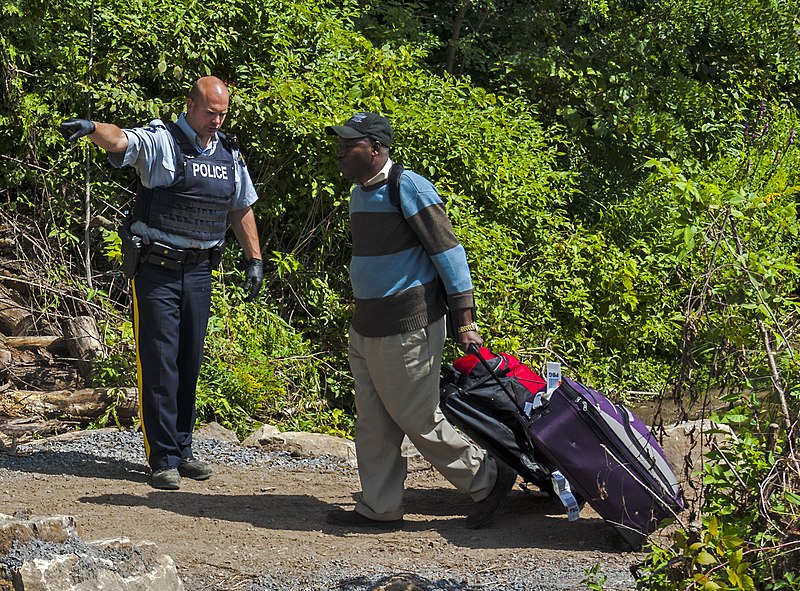Tim Worstall is writing here about the situation in the United Kingdom, with would-be asylum claimants risking their lives to cross the English Channel so they can legally claim asylum in Britain, but exactly the same situation should apply with claimants entering Canada from the United States:

An asylum seeker, crossing the US-Canadian border illegally from the end of Roxham Road in Champlain, NY, is directed to the nearby processing center by a Mountie on 14 August, 2017.
Photo by Daniel Case via Wikimedia Commons.
Everyone at even risk – let alone reality – of substantial discrimination in their home country has the right, the right, to asylum. This is one of those international things that we should indeed agree with too. Few of us have anything but contempt for those who wouldn’t let Holocaust fleeing Jews (and or gypsies, gays, whatever, it’s just that we have substantial documented evidence about Jews who were turned away) tarnish their national doormats. Few of us think those who abused such limitations are anything but heroes. I even know of one monk who married Jewesses multiple times to bring them out by train. Umm, married multiple people, not one many times. People working within the too restrictive rules even gave us one of the finest moments of TV ever.
So, asylum, good thing.
And here’s the next thing. That right is restricted. To claiming it in the first safe place you get to. This has some oddities, if you leave Sudan by plane and step off at Heathrow then the UK is where you can – righteously – claim asylum. If you come by land then you have passed through many safe places before reaching the UK. You don’t have the right to asylum in the UK and, to be strict about it, don’t even have the right to apply.
So, people drowning in the Channel because they have to make their asylum application once in the UK? This could be true of those who are being oppressed in France. It’s not true of anyone not being oppressed in France. So there is not that need to take the open boat the 26 miles.
Sure, there’s the desire, we all understand that. But that’s a desire, not a right to asylum.
Here in Canada, we had this arrangement with the American government under the Canada-United States Safe Third Country Agreement, which our Federal Court struck down last month — incorrectly, in my opinion — as being in violation of section 7 of the Canadian Charter of Rights and Freedoms. The court allowed six months for the federal government to act, but as we all know, the federal government is unlikely to do anything as politically radioactive as passing legislation that could — and would — be seen as anti-refugee.







